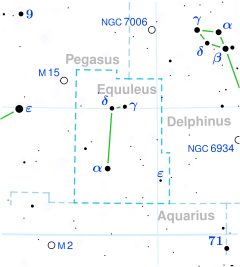
| |
| Observation data Epoch J2000 Equinox J2000 | |
|---|---|
| Constellation | Equuleus |
| Right ascension | 21 04 34.65147 |
| Declination | +5° 30′ 10.3032″ |
| Apparent magnitude (V) | 5.593 |
| Characteristics | |
| Spectral type | K5 III |
| U−B color index | +1.934 |
| B−V color index | +1.651 |
| Astrometry | |
| Radial velocity (Rv) | –15.26 ± 0.2 km/s |
| Proper motion (μ) | RA: +13.15 mas/yr Dec.: +0.66 mas/yr |
| Parallax (π) | 4.24 ± 0.42 mas |
| Distance | 770 ± 80 ly (240 ± 20 pc) |
| Absolute magnitude (MV) | –1.02 |
| Details | |
| Radius | 63 R☉ |
| Luminosity | 949 L☉ |
| Temperature | 3,893 K |
| Rotational velocity (v sin i) | 4.6 km/s |
| Other designations | |
| ζ Equ, 3 Equ, BD+04° 4606, HD 200644, HIP 104031, HR 8066, SAO 126518. | |
| Database references | |
| SIMBAD | data |
3 Equulei is a single star located in the small northern constellation of Equuleus. It is faintly visible to the naked eye at an apparent visual magnitude of 5.6. Based upon an annual parallax shift of 4.24 mas, 3 Equulei is roughly 770 light-years (240 parsecs) distant from Earth, give or take an 80 light-year margin of error. At that distance, the apparent brightness of the star is diminished by 0.15 in visual magnitude because of extinction from interstellar gas and dust.
3 Equulei has been referred to in some sources as ζ (Zeta) Equulei, although it was not given that designation by Bayer.
Properties
3 Equulei is an evolved giant star with a stellar classification of K5 III. The measured angular diameter of this star, after correction for limb darkening, is 2.44 ± 0.03 mas. At the estimated distance of 770 light-years, this yields a physical size of about 63 times the radius of the Sun. It is radiating an estimated 949 times the luminosity of the Sun from this expanded outer envelope at an effective temperature of 3,893 K. At this heat, it shines with the orange-hued glow of a K-type star.
References
- ^ van Leeuwen, F. (November 2007), "Validation of the new Hipparcos reduction", Astronomy and Astrophysics, 474 (2): 653–664, arXiv:0708.1752, Bibcode:2007A&A...474..653V, doi:10.1051/0004-6361:20078357, S2CID 18759600.
- ^ Cousins, A. W. J. (1984), "Standardization of Broadband Photometry of Equatorial Standards", South African Astronomical Observatory Circulars, 8: 59, Bibcode:1984SAAOC...8...59C.
- ^ Eggleton, P. P.; Tokovinin, A. A. (September 2008), "A catalogue of multiplicity among bright stellar systems", Monthly Notices of the Royal Astronomical Society, 389 (2): 869–879, arXiv:0806.2878, Bibcode:2008MNRAS.389..869E, doi:10.1111/j.1365-2966.2008.13596.x, S2CID 14878976.
- ^ Famaey, B.; et al. (January 2005), "Local kinematics of K and M giants from CORAVEL/Hipparcos/Tycho-2 data. Revisiting the concept of superclusters", Astronomy and Astrophysics, 430 (1): 165–186, arXiv:astro-ph/0409579, Bibcode:2005A&A...430..165F, doi:10.1051/0004-6361:20041272, S2CID 17804304.
- Ryon, Jenna; Shetrone, Matthew D.; Smith, Graeme H. (August 2009), "Comparing the Ca ii H and K Emission Lines in Red Giant Stars", Publications of the Astronomical Society of the Pacific, 121 (882): 842–856, arXiv:0907.3346, Bibcode:2009PASP..121..842R, doi:10.1086/605456, S2CID 17821279.
- ^ Lang, Kenneth R. (2006), Astrophysical formulae, Astronomy and astrophysics library, vol. 1 (3 ed.), Birkhäuser, ISBN 3-540-29692-1. The radius (R*) is given by:
- ^ Henry, Gregory W.; et al. (September 2000), "Photometric Variability in a Sample of 187 G and K Giants", The Astrophysical Journal Supplement Series, 130 (1): 201–225, Bibcode:2000ApJS..130..201H, CiteSeerX 10.1.1.40.8526, doi:10.1086/317346, S2CID 17160805.
- ^ Soubiran, C.; Le Campion, J.-F.; Cayrel de Strobel, G.; Caillo, A. (June 2010), "The PASTEL catalogue of stellar parameters", Astronomy and Astrophysics, 515: A111, arXiv:1004.1069, Bibcode:2010A&A...515A.111S, doi:10.1051/0004-6361/201014247, S2CID 118362423.
- "* 3 Equ". SIMBAD. Centre de données astronomiques de Strasbourg.
- Hoffleit, D.; Warren, W. H. (1995). "VizieR Online Data Catalog: Bright Star Catalogue, 5th Revised Ed. (Hoffleit+, 1991)". VizieR On-line Data Catalog: V/50. Originally Published in: 1964BS....C......0H. 5050. Bibcode:1995yCat.5050....0H.
- Richichi, A.; Percheron, I.; Khristoforova, M. (February 2005), "CHARM2: An updated Catalog of High Angular Resolution Measurements", Astronomy and Astrophysics, 431 (2): 773–777, Bibcode:2005A&A...431..773R, doi:10.1051/0004-6361:20042039
- "The Colour of Stars", Australia Telescope, Outreach and Education, Commonwealth Scientific and Industrial Research Organisation, December 21, 2004, archived from the original on March 18, 2012, retrieved 2012-07-21.
External links
| Constellation of Equuleus | |||||||||||||
|---|---|---|---|---|---|---|---|---|---|---|---|---|---|
| Stars |
| ||||||||||||
| |||||||||||||
| Galaxies |
| ||||||||||||
